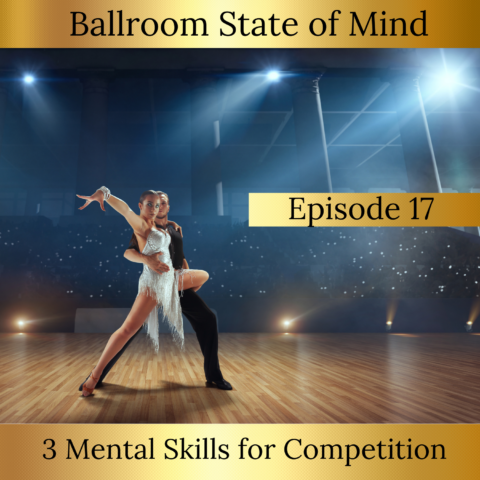
In this episode, we share 3 mental skills you can develop to be more resilient and mentally strong at competitions.
1. Attentional Control– You are responsible for directing your attention and then holding it. Whatever you give your attention, you give power. Additionally, whatever you allow into your attention, you will have to manage your mind around. Constraining your attention, then, is probably the greatest factor in how you feel at competitions. Know what helps you and what doesn’t. You might decide to not even look at heatlists ahead of time. If knowing who is dancing, how many people you are dancing against, or other details, will throw you off or stress you out, don’t look at them. On the other hand, if surprises throw you off, you may choose to have all the information so that you feel prepared and know what to expect. In the long run, you can learn to let more input in and be more resilient no matter the circumstances. But if something is a problem, try giving it less attention and importance.
2. Focusing on the present–One place to practice directing your attention is to the present moment. When you bring the past into the future, you may be bringing negative emotion into the present. Past competitions, even previous heats that didn’t go well, don’t need to come with you into the future. You can practice resetting quickly after setbacks. The past isn’t often relevent to the now. We just keep bringing it forward. This can bring guilt, fear and worry into the present. You gotta have a short memory. Focusing on the future creates anxiety when you think about how you are going to do, what your results are going to be, what judges are going to decide about you, etc. Because the future is unpredictable and uncontrollable, it feels unstable and our brain can’t grasp on to anything. This generates anxiety and fear. Keep your mind in the present moment–what you need to be doing NOW. Focus on skills, partnering, making decisions about the now, making adjustments to the now. Practice keeping your attention in the present.
3. Emotional Regulation–It’s your responsibility to attend to your emotions. When you need soothing or settling down, you have the ability to do that. You might just not be very practiced at it. When you need to be amped up, or cheerlead yourself, you can do that too. It’s important you address stress early on, because if you wait until you are having a breakdown, it will be much harder to turn it around very quickly. We all have a threshold where we “go over the edge” with stress and we want to keep ourselves away from the edge. This means noticing our emotional state and addressing it earlier on with stress reducing techniques, self-talk, and attentional control.
Put these three things into practice in your every day life. Applying it to your everyday as well as your dancing will make it a part of you and you will start to feel more in control of yourself in higher pressure situations.